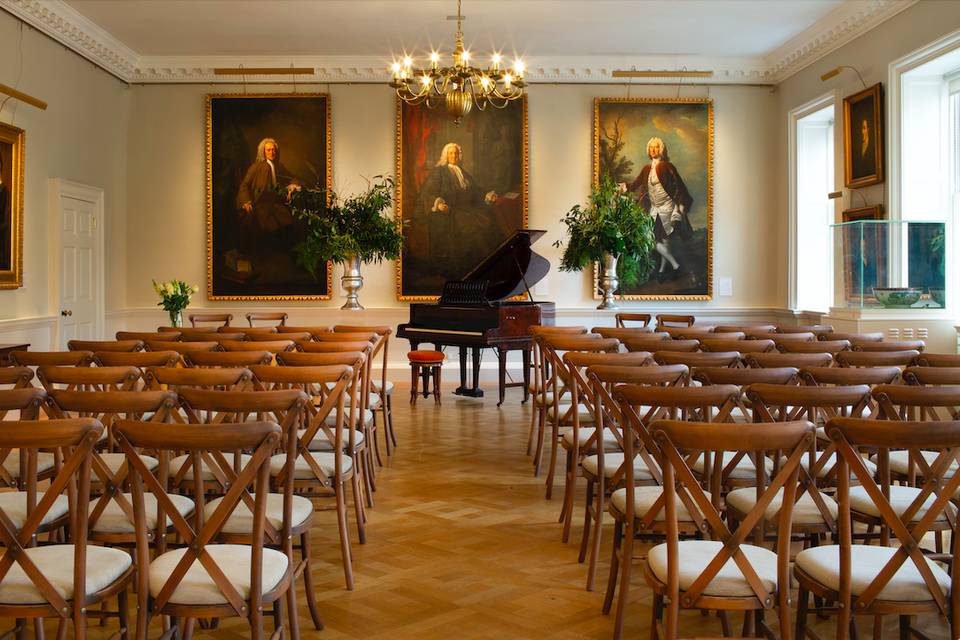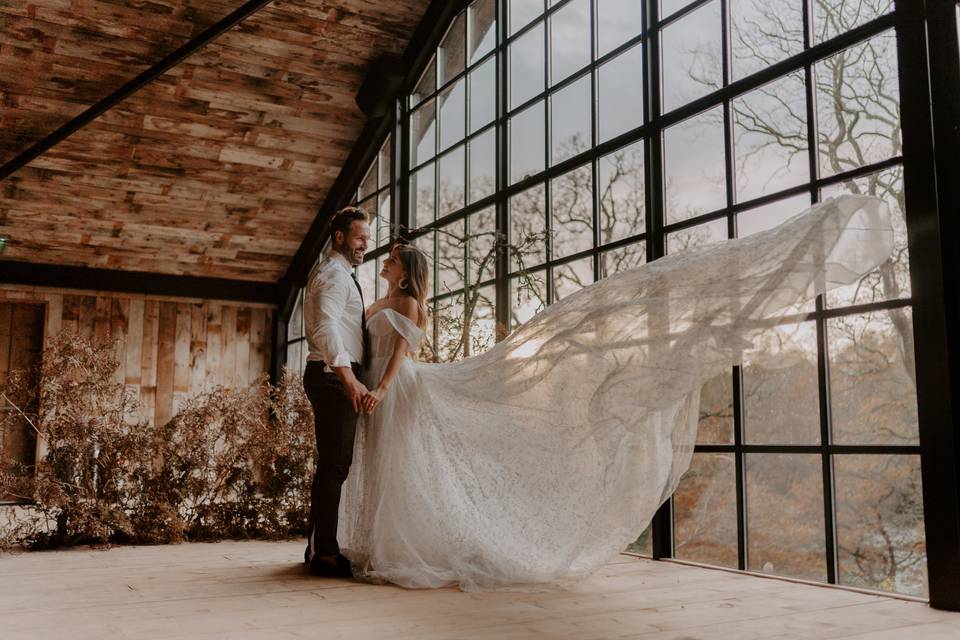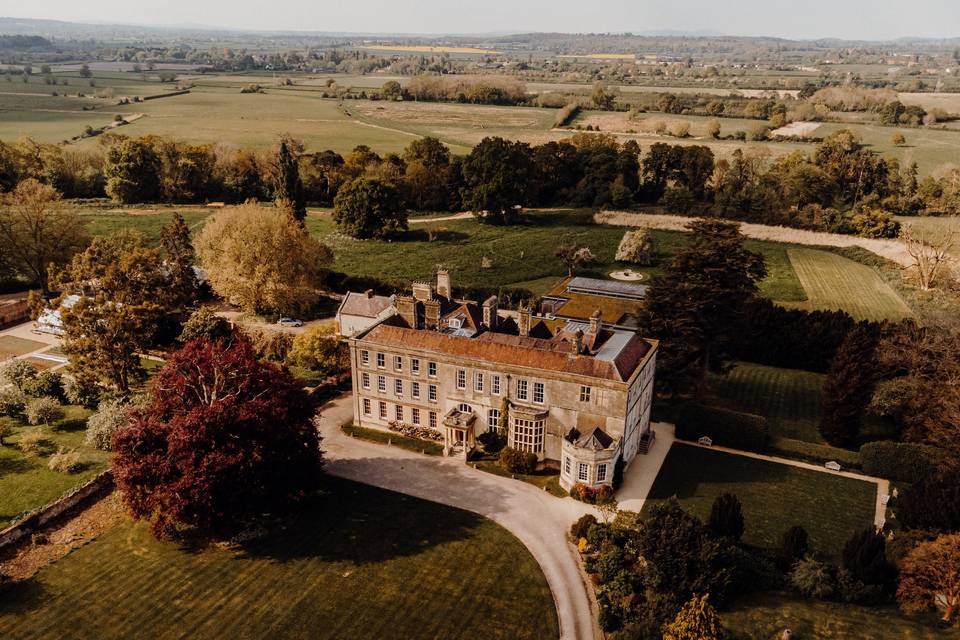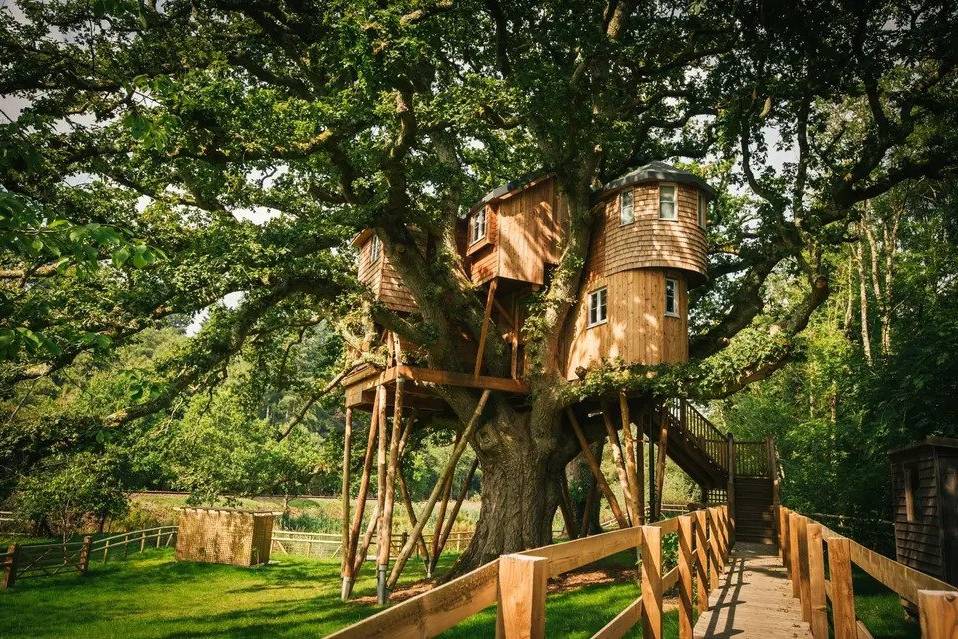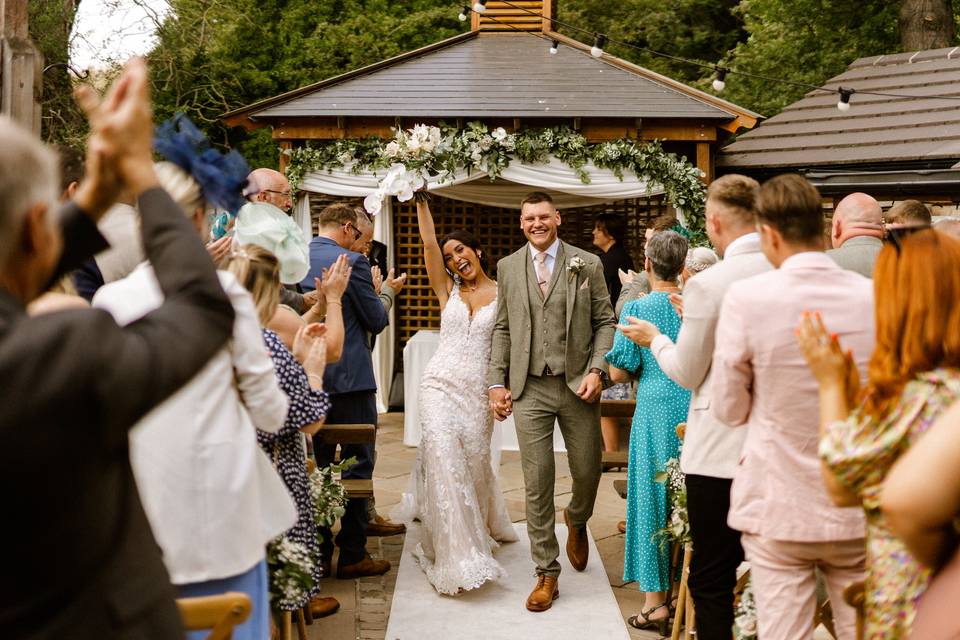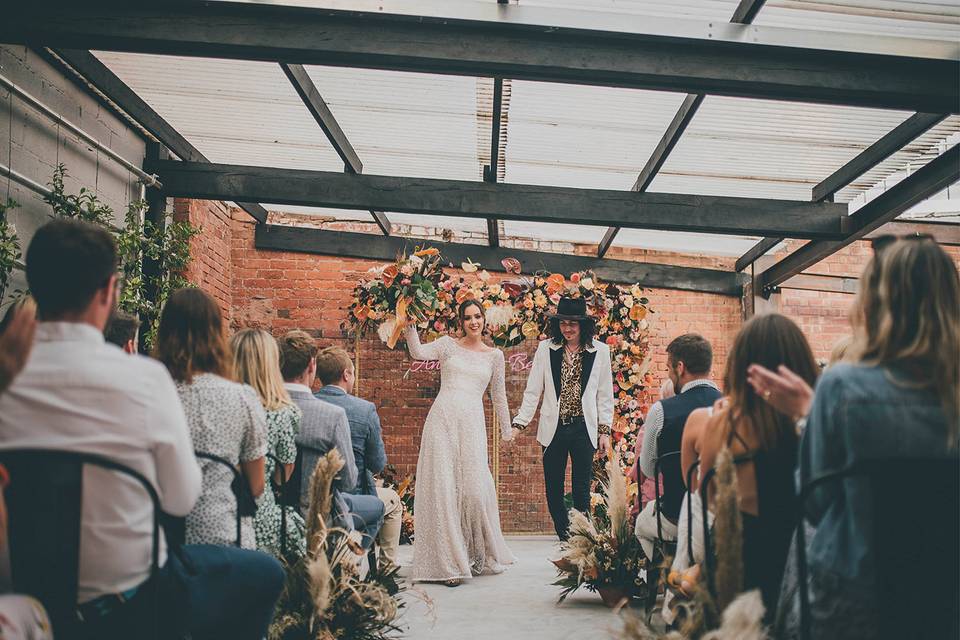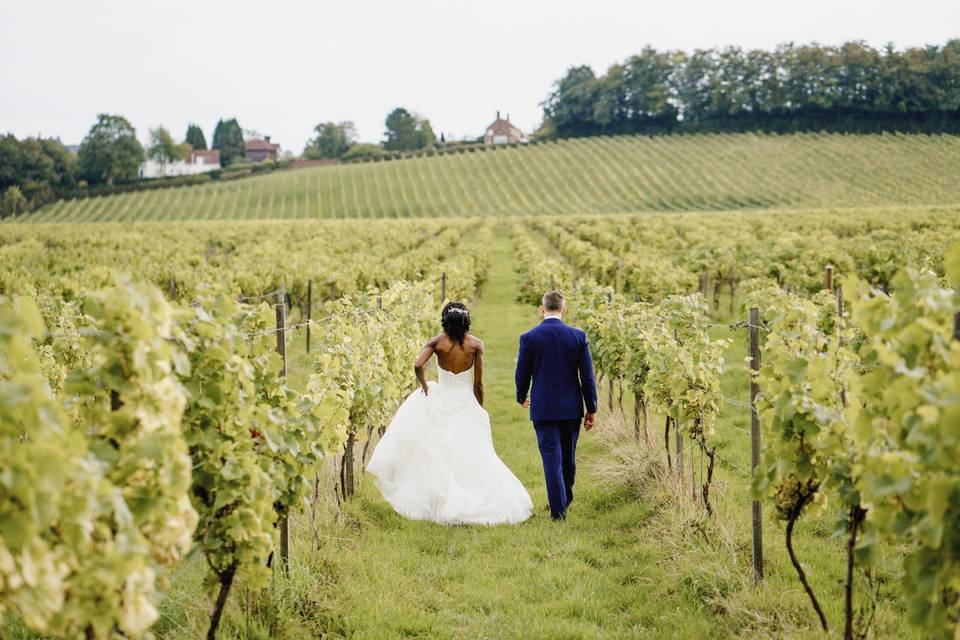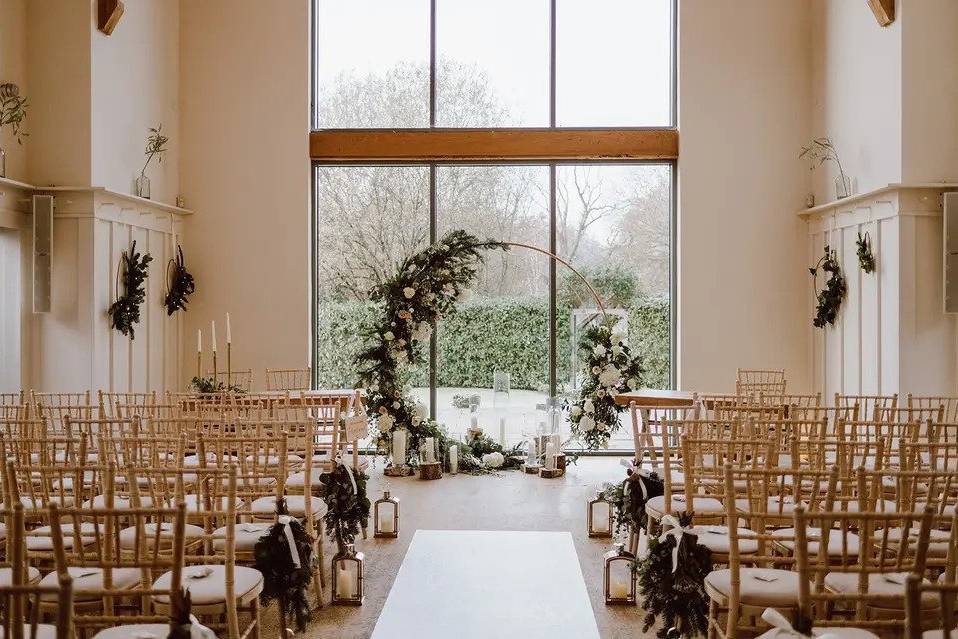What to Expect at a Chinese Wedding: The Ceremony & Traditions Explained
Chinese weddings are vibrant, colourful occasions steeped in rich history and tradition. While no two ceremonies will ever look exactly the same, here’s just some of what you can expect to see if you’re attending your first one.
Going to your first Chinese wedding is an amazing opportunity to experience lots of beautiful new traditions and rituals, either by immersing yourself in them or by observing the happy couple taking part in them on their big day.
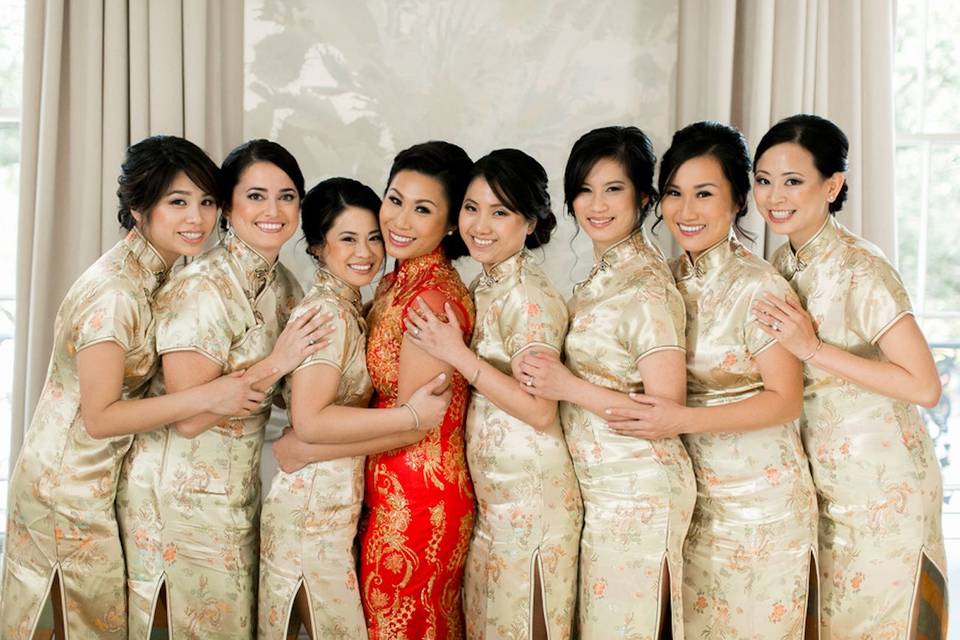
‘With Chinese weddings, it is important to note that China, Hong Kong and Taiwan all have the same main key features of the wedding day,’ says luxury weddings and events stylist and planner Emma Murray-Jones. However, each province and ethnic minority can also have their own unique traditions and variations.
While the details of each Chinese wedding will, of course, be personal to the couple who are hosting and their families, there are plenty of common customs that you can take the time to educate yourself on before the (very carefully selected) date arrives.
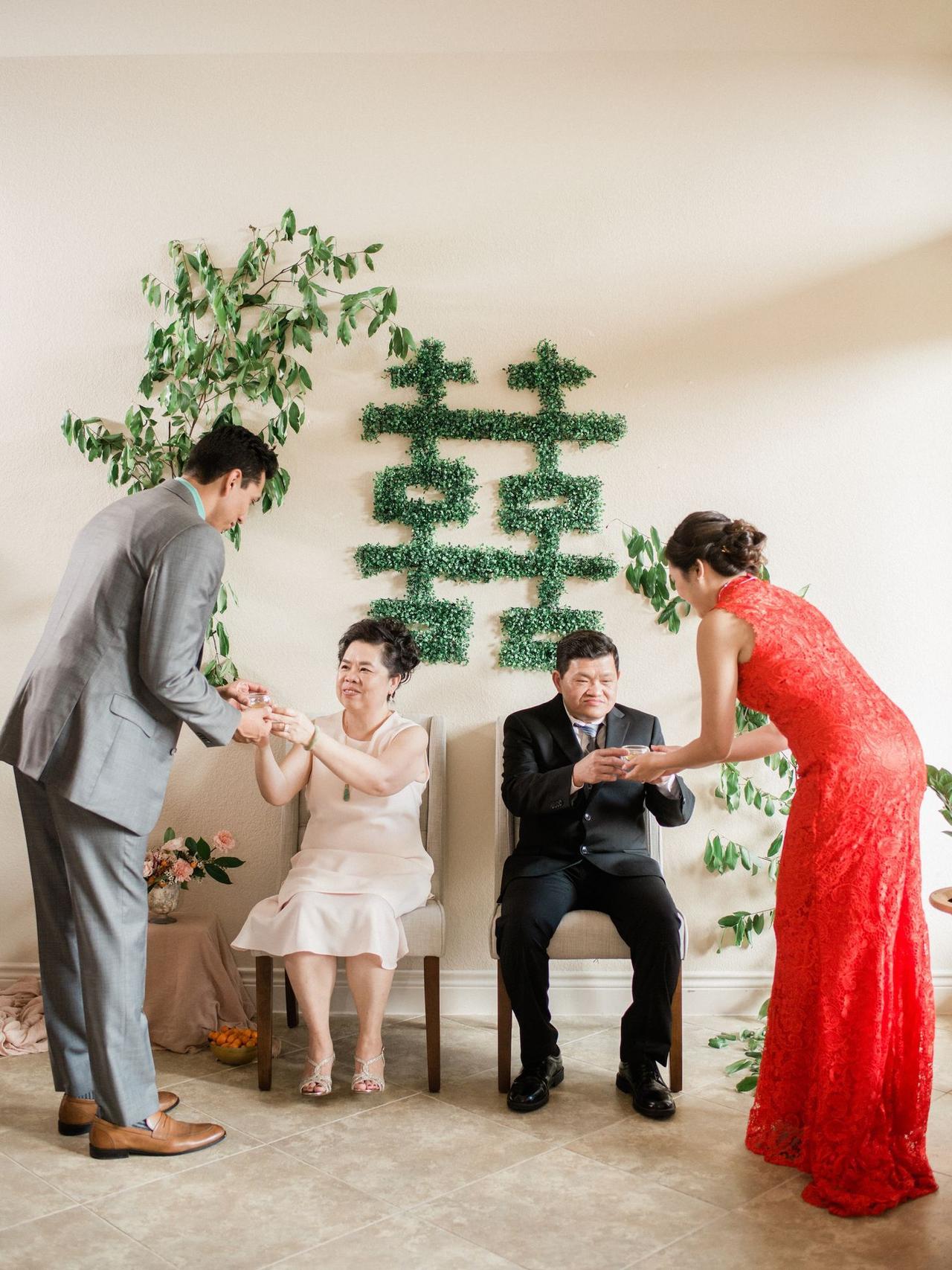
We’ve asked the experts to break down everything you have to look forward to, plus all of the dos and don’ts to be aware of to ensure you’re enjoying the celebrations in a respectful way. Red envelopes at the ready…
READ MORE:
- What to Expect at a Jewish Wedding
- What to Expect at an Indian Wedding
- Multicultural Weddings: How Real Couples Merged Their Cultures on Their Wedding Day
What Happens at a Chinese Wedding?
‘Nowadays, a Chinese wedding will start with the traditional Chinese ceremonies in the morning of the Picking up of the Bride and the Tea Ceremony,’ says Emma (more on these below). ‘These ceremonies are usually very intimate and typically only very close family and friends, as well as the bridal party would be invited to them.’
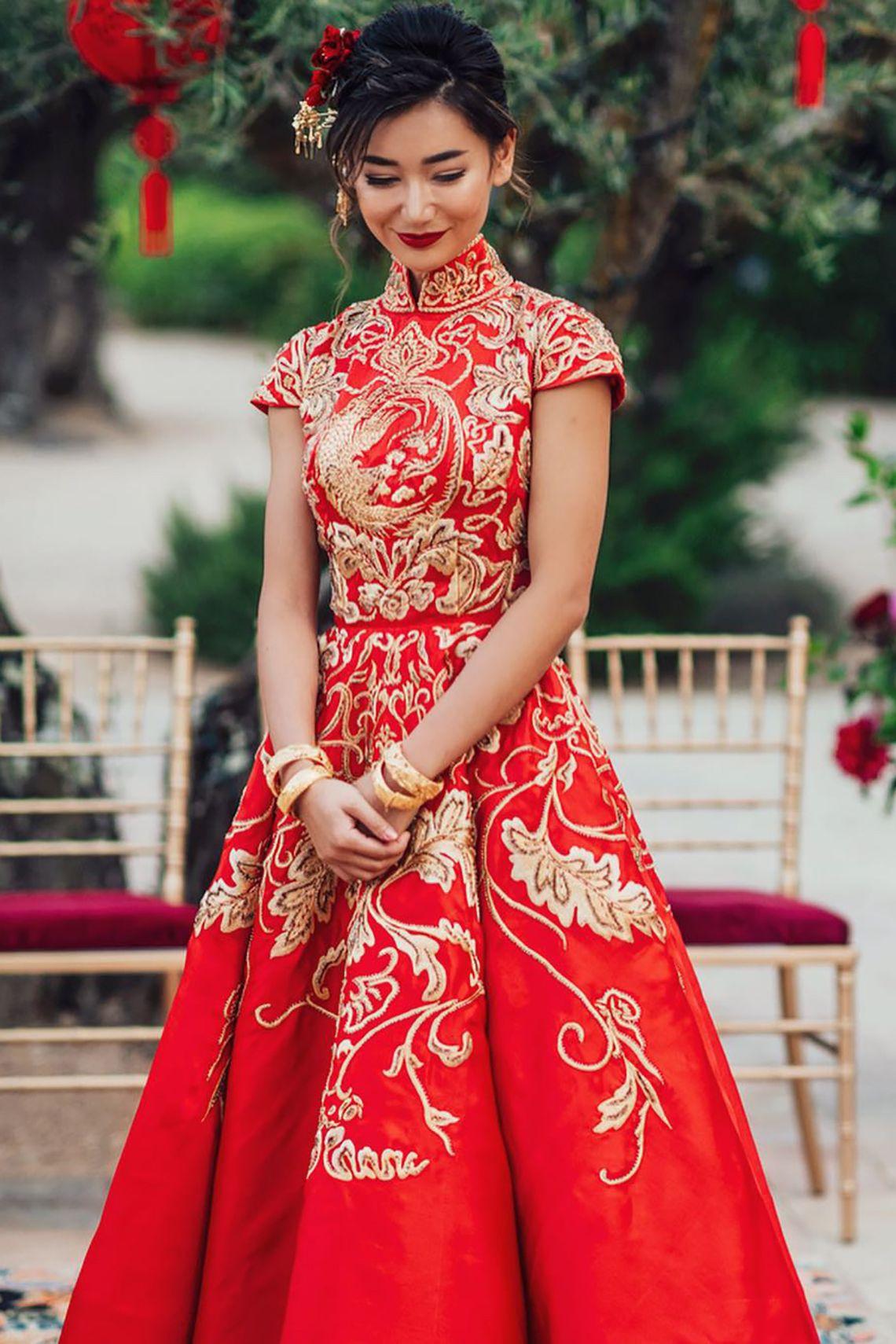
‘This would then be followed by the signing of the marriage license. Depending on the couple, this may be at a local government office or some couples will pick a church, and have your typical white wedding.’
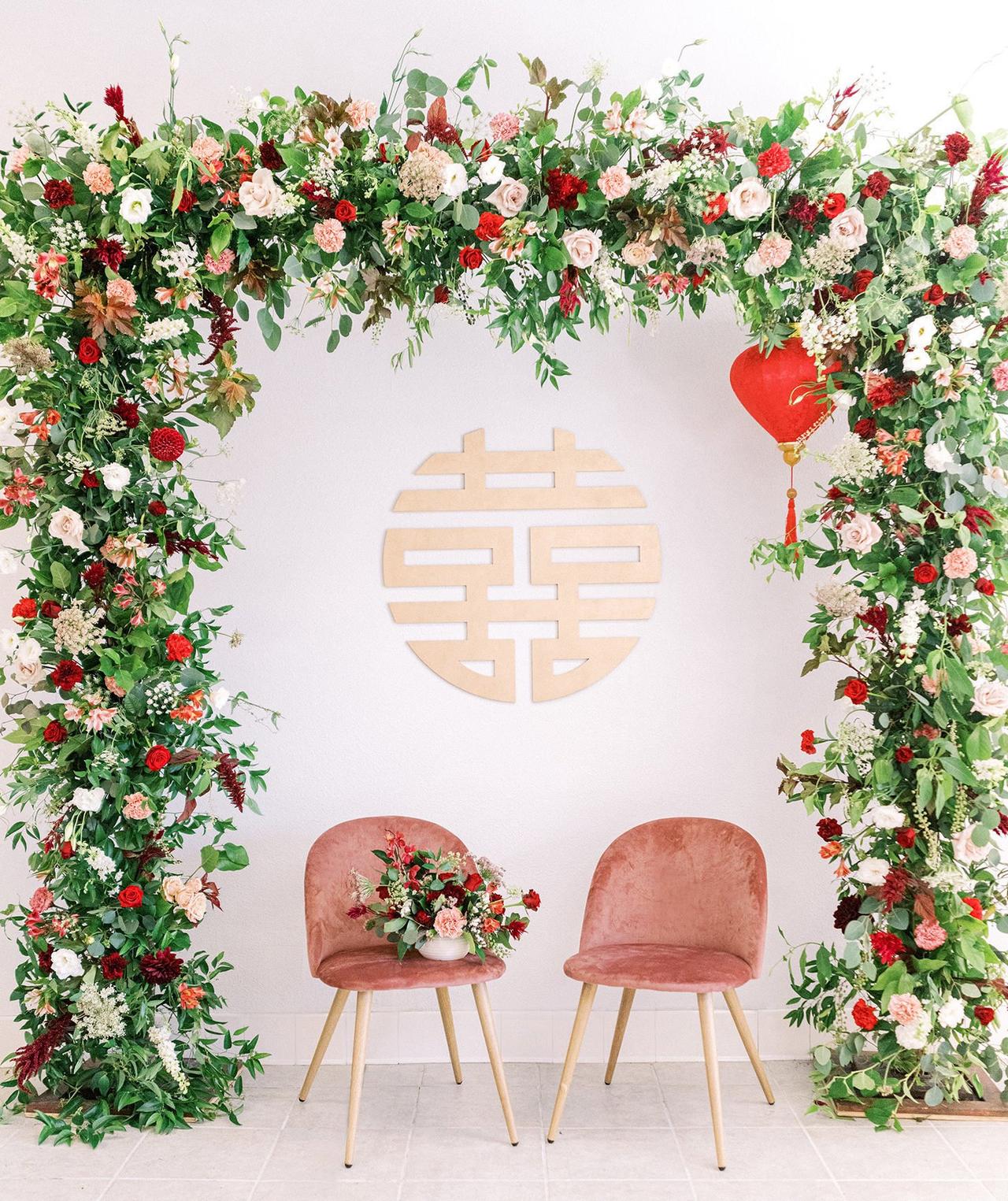
‘The wedding banquet, what Western culture would call the wedding reception or breakfast, closes the wedding day festivities. Wedding banquets are a grand affair and would usually have at least 100 guests, with the larger banquets having several hundred. All close and extended relatives and friends are invited, to announce the marriage of the happy couple. Guests are always seated on round tables, and long tables are not typically used.’
How Long is a Chinese Wedding?
‘A modern day Chinese wedding will usually take place in one day. However, it does depend on how many traditional customs are included and can last up to three days,’ Emma notes.
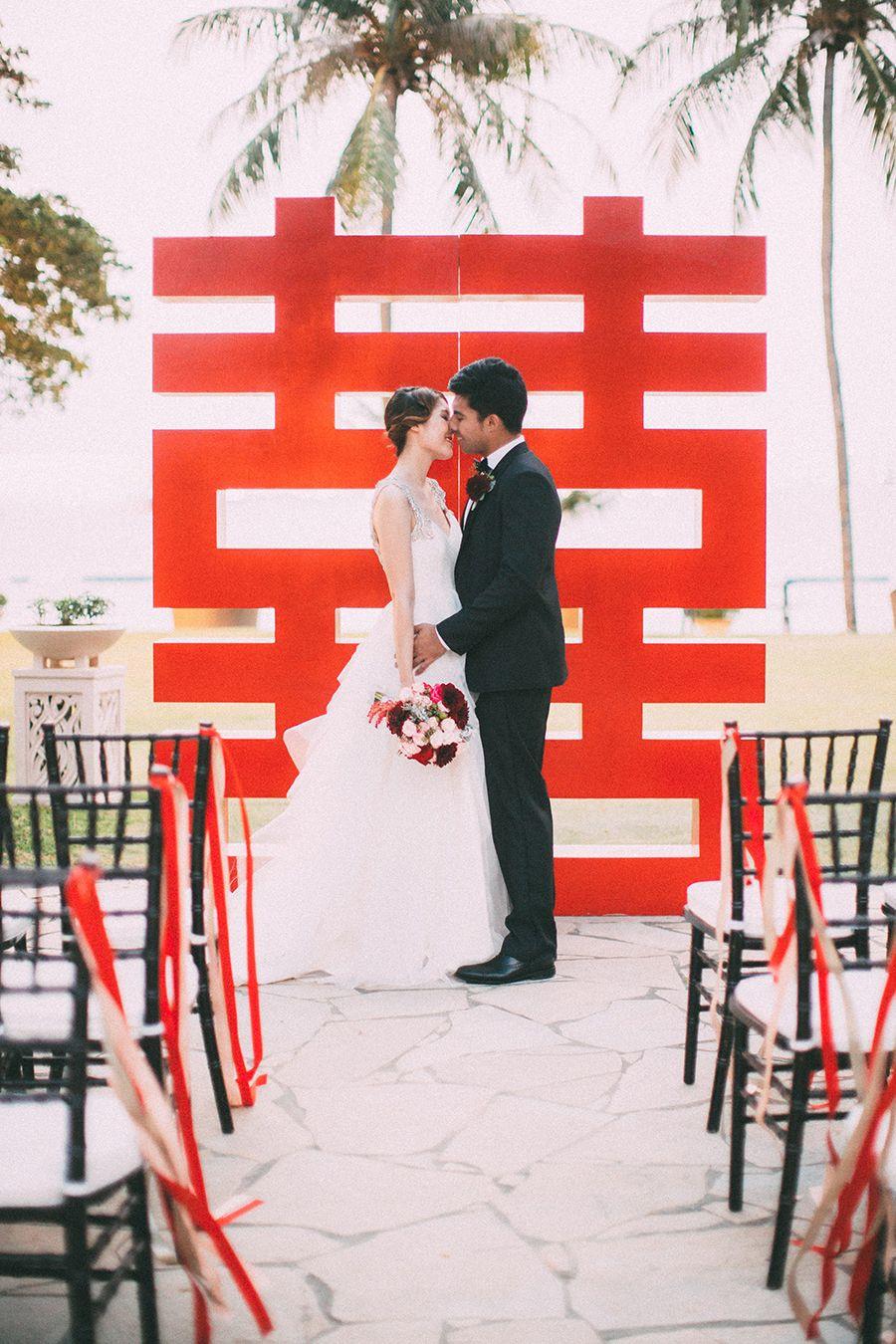
While you won’t get to take part in this bit, another interesting custom is that the couple may extend the number of days even further with pre-arranged photoshoots. ‘Many brides and grooms do take their wedding photos before the wedding day, to give them time to get the right shots,’ she adds.
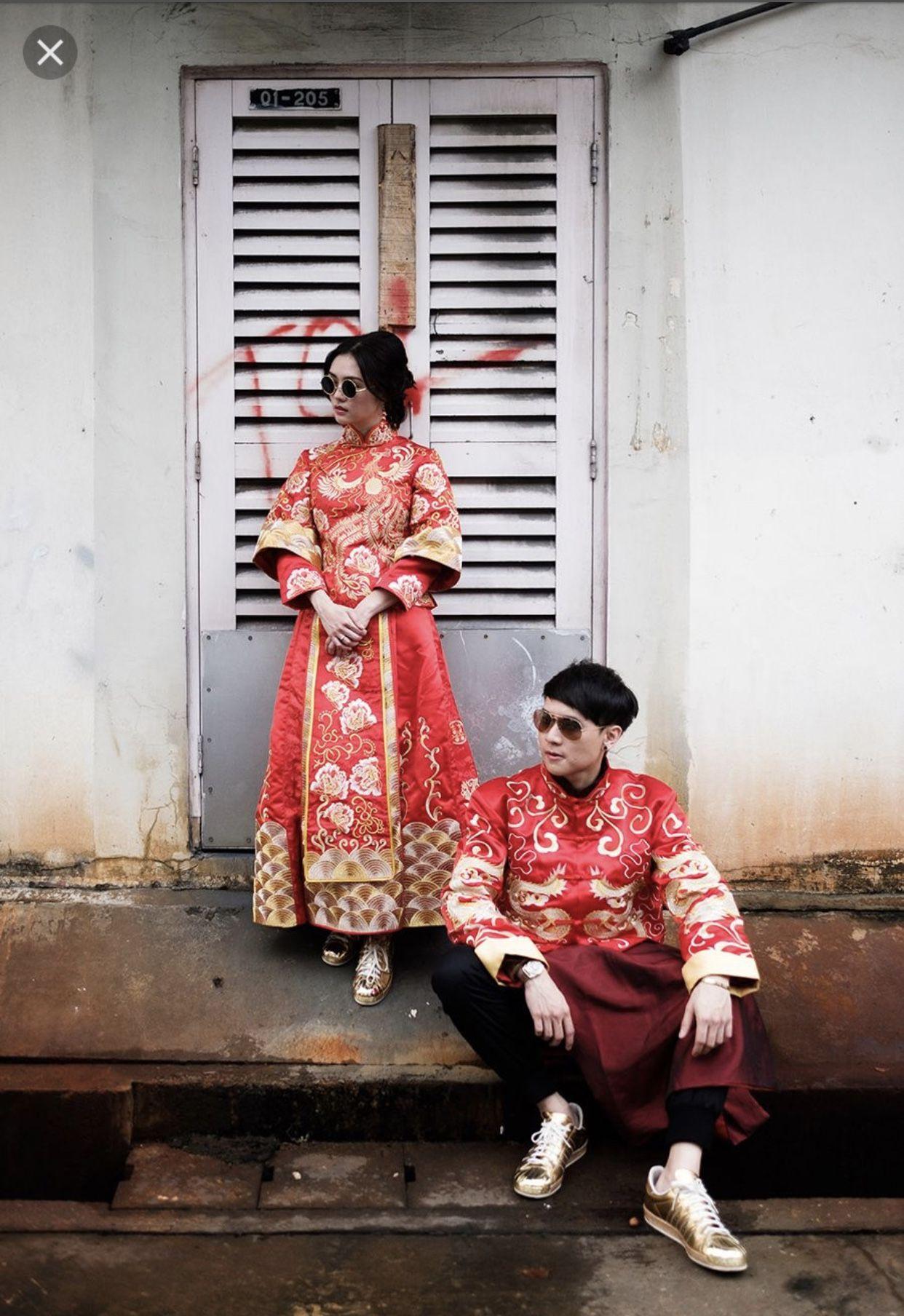
‘It is also increasingly popular for couples to travel to European capital cities after their wedding or as part of their honeymoon, with their wedding day outfits and then take wedding photos at the most famous landmarks. There also many tours especially designed to take several couples at one time on such shoots.’ Any excuse to keep the magic of your wedding day going, we’re all for it.
READ MORE: 17 Things Guests Hate Most About Weddings
What Traditions Happen at a Chinese Wedding?
Emma breaks down the details of all of the traditions you should know about:
The Date
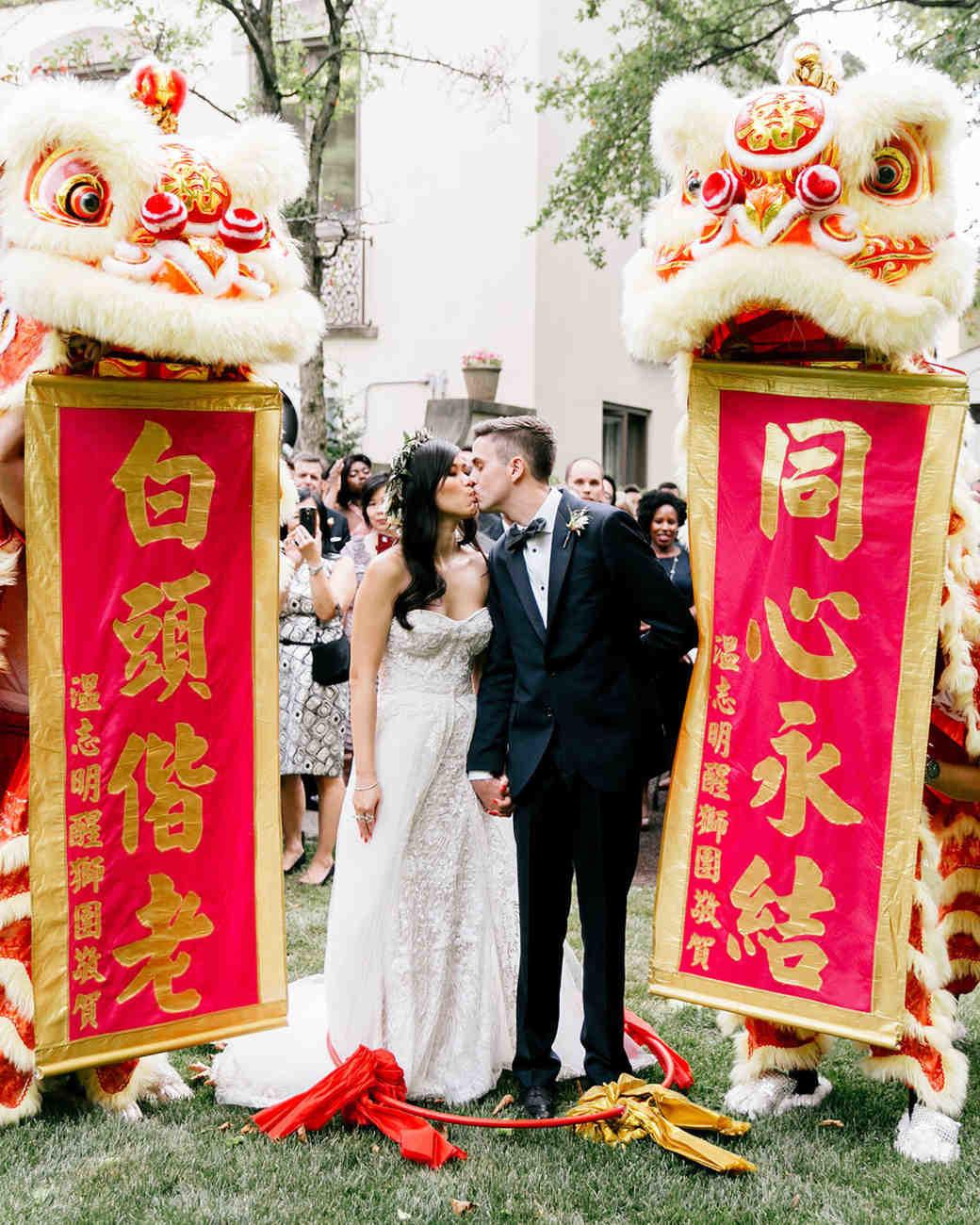
One of the most important traditions for the couple and their family, is the picking of the wedding date. Many couples will consult a fortune teller, Chinese monk or Feng Shui master to choose an auspicious date to bring happiness and success to their marriage. The couple’s birthdays and their zodiac signs will play an important part in picking the best date in the lunar calendar.
Picking up the Bride
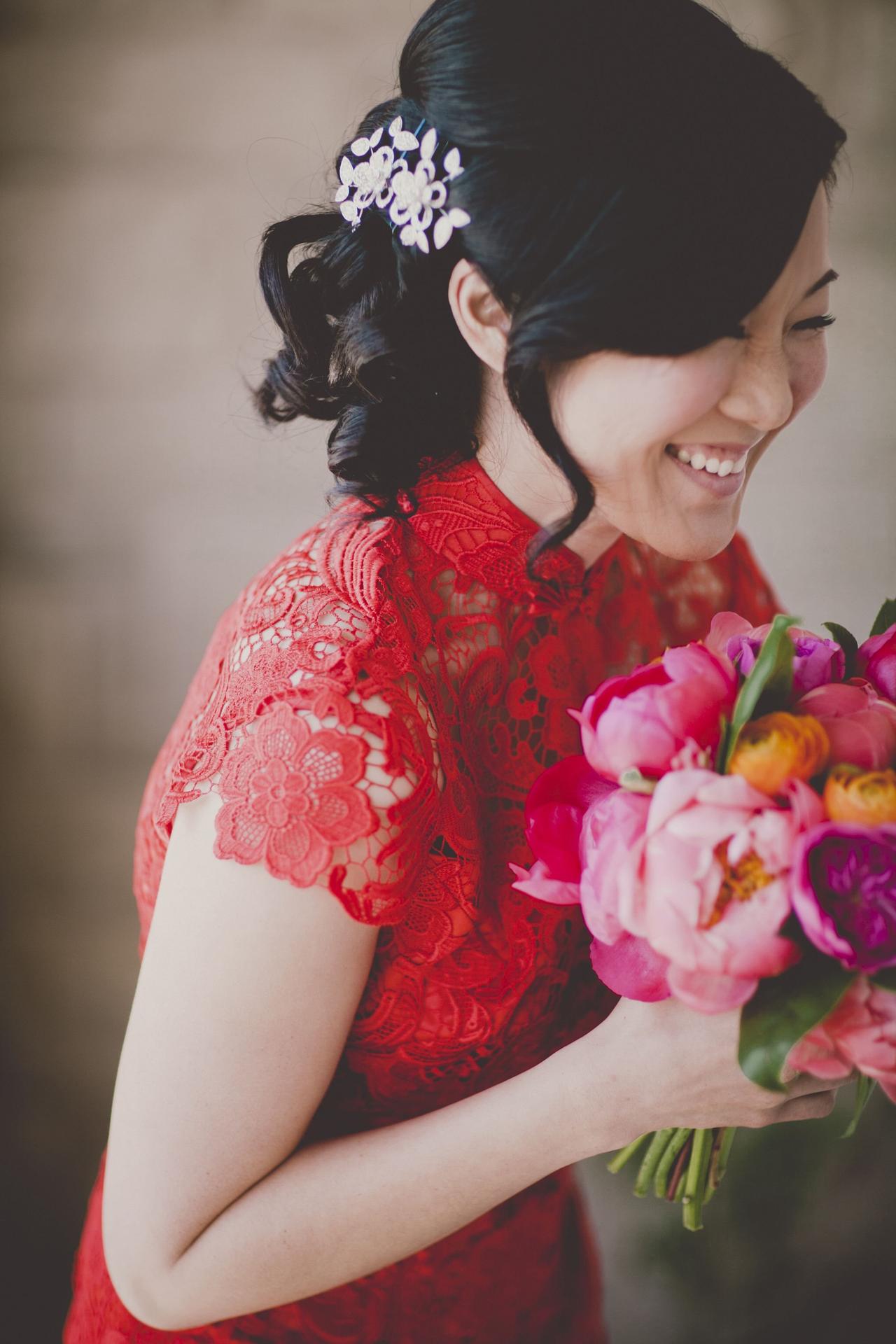
This is a longstanding tradition that has been modernised over the years. It is no longer a large procession, which would have passed through the village or town, to collect the bride from her family home. Today, it can involve anything from a procession of several luxury cars to fire crackers, the playing of drums or even a lion dance troupe to collect the bride. Traditionally a child would walk in front of the processions with the groom to symbolise fertility, again in today’s modern world this is not always possible.
Putting the Groom to the Test
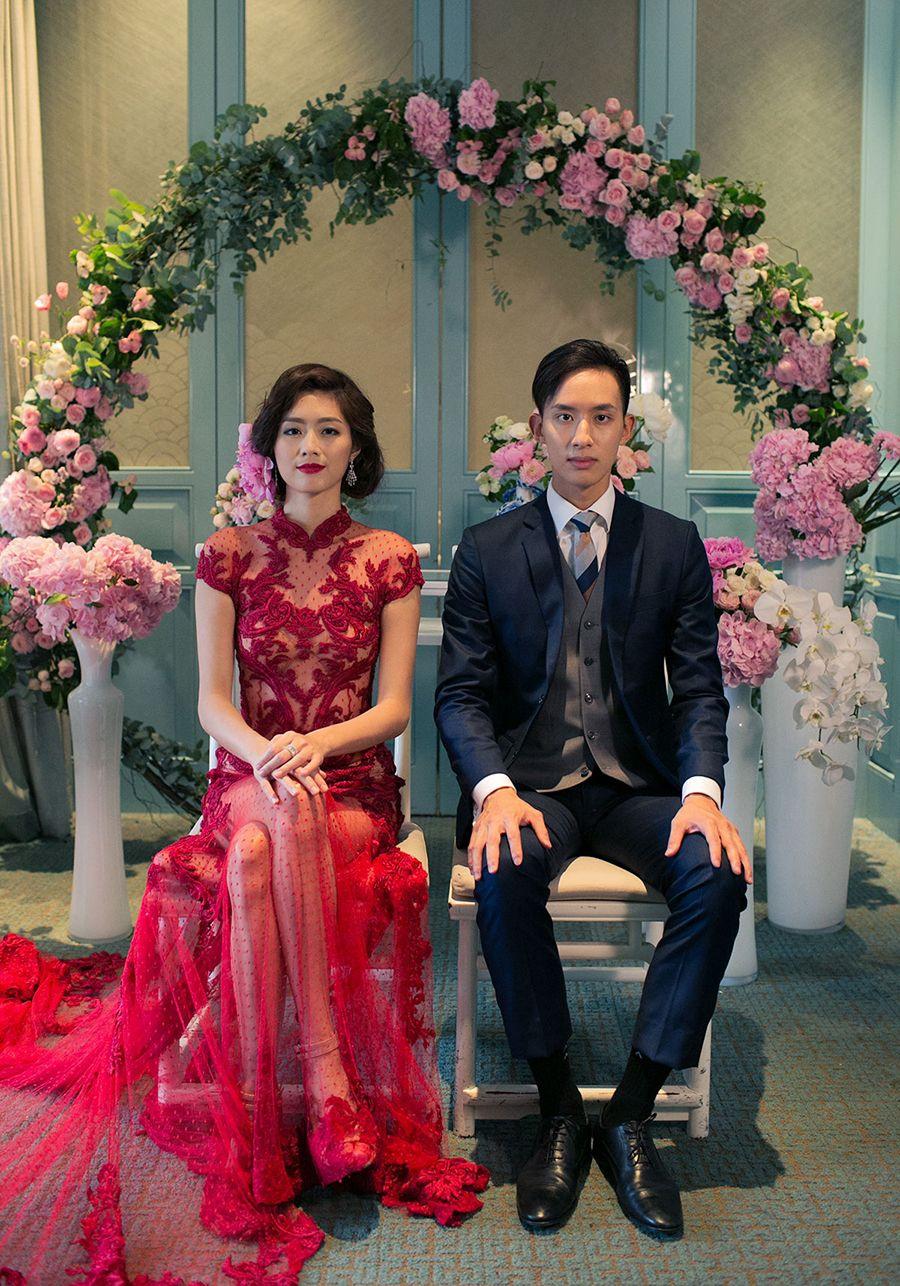
Also known as the ‘door games’, which can be a source of great fun and amusement for the close family and friends and bridal party as they watch on or take part! As is custom these are tests prepared by the bridesmaids to test the groom’s determination to marry the bride. The tests vary from questions to demonstrate how well he knows the bride, to challenges like eating something spicy or sour, to show he will be able to withstand every aspect of a marriage. I know of one groom was even asked to dress up in a banana costume! While these tests are taking place, the bride will be locked in her room with her key bridesmaids, who will only unlock the door, once they are satisfied with the groom's answers. The groom will also have to hand over money to the bridesmaids during the tests to allow them to handover the bride.
Once the groom is allowed into the bride’s room, his last challenge is to find one of the bride’s shoes which will have been hidden. Only then, can they move onto the next part of their wedding day together.
The Tea Ceremony
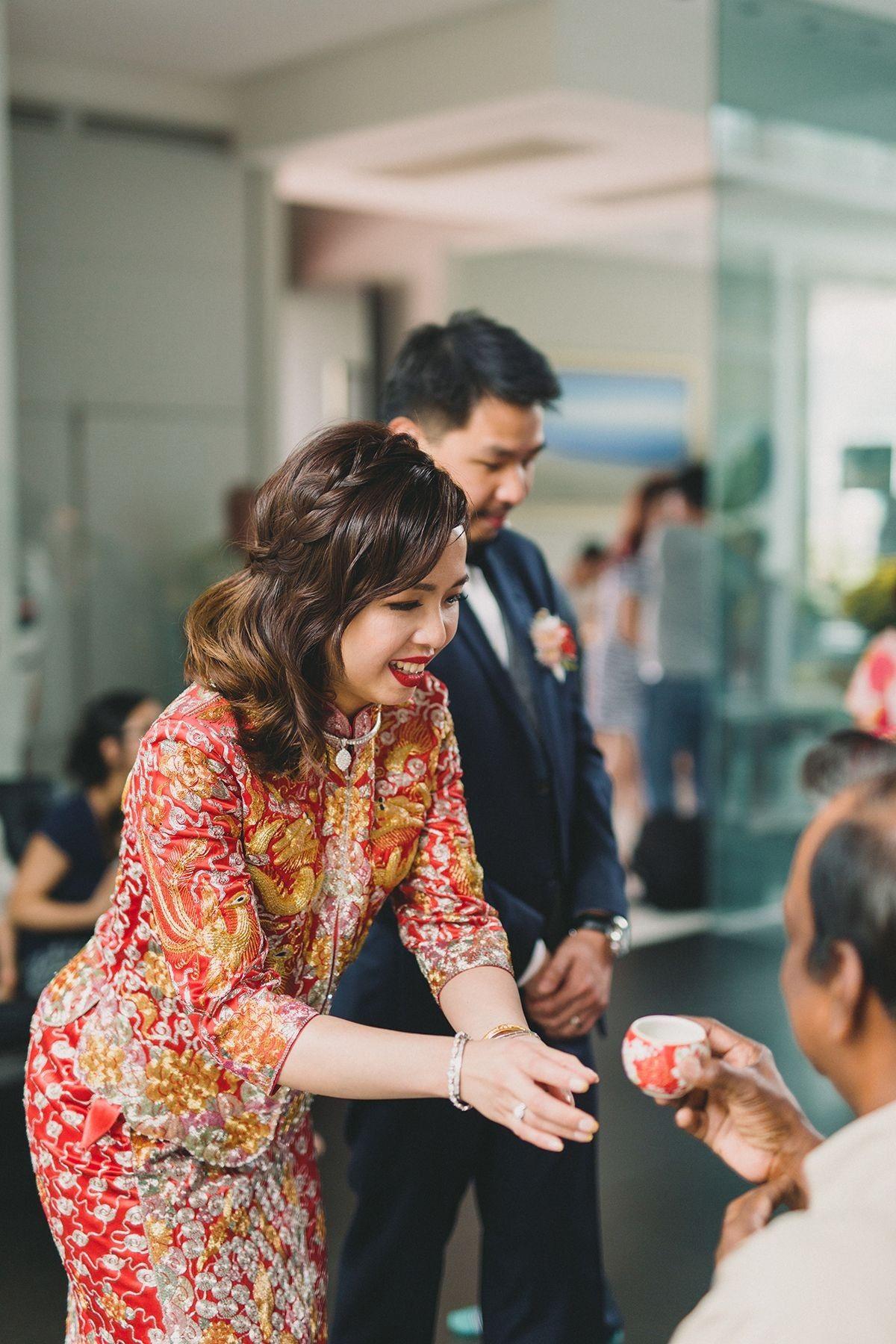
Perhaps one of the most well-known and crucial components of a Chinese wedding day. During this ceremony, the couple show great respect and gratitude to their parents, for their upbringing. Traditionally the ceremony will take place in one location, and is often hosted at home, however this does vary depending on the couple's plan for the day. A red china tea set with the ‘double happiness’ symbol (another integral symbol of any Chinese wedding) will be used and black tea is served. A bridesmaid will pass the tea cups to the couple, who will be kneeling on the floor in front of their parents.
The parents will usually be seated in elegant and impressive wooden chairs, usually with arms. The groom’s family is served first and as the tea is served, the phrase ‘please drink tea’ is spoken to them by the couple. After each parent has taken their sip of tea, the couple will be offered a red envelope with money or gold jewellery to bless the couple. The couple will then serve tea to the paternal uncle and aunts, in order of age, then to their older married siblings. Once this has been done, this is then repeated for the maternal family. These ceremonies, which were once always held at home, are now often held at the hotel, where the wedding banquet will take place that evening.
Other Symbolic Traditions
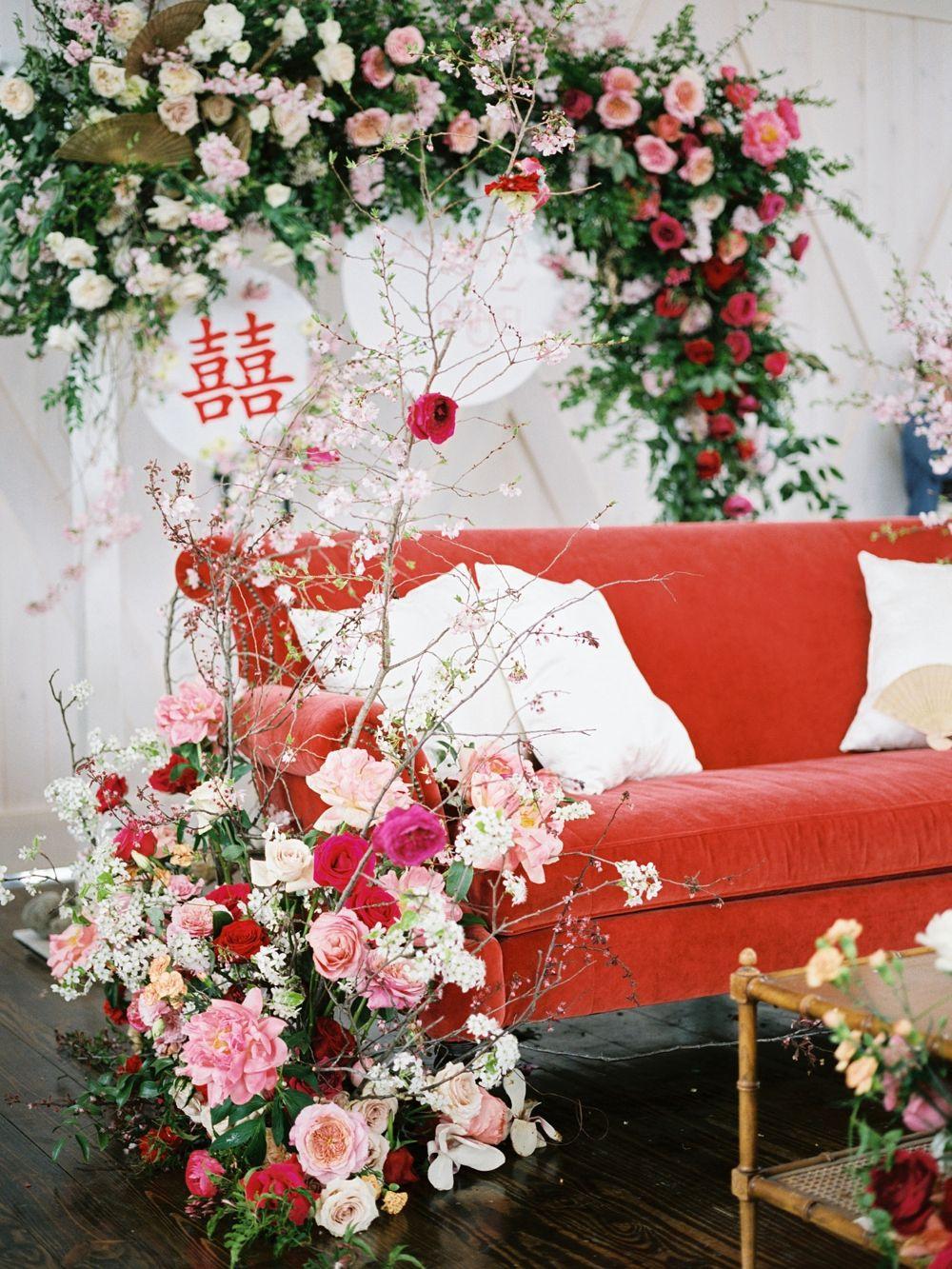
Depending on the couple and their family there are also symbolic traditions with regards to the bethrothal and bride’s dowry or betrothal gifts to the bride’s family. Traditionally the bride should also leave her family home crying to show her reluctance to leave home when she is collected by the groom. There are also traditional hair combing customs that take place at home night before the wedding, that the bride and groom also complete separately, to wash away any bad spirits and bring good fortune to their marriage. Three days after the wedding it is tradition for the bride and groom to visit the bride’s family home, where she is now a guest. A mini banquet is served in her honour, and the groom would typically bring a suckling roast pig as a gift.
READ MORE: 39 of The Biggest Wedding Guest Mistakes to Avoid
What Should I Wear to a Chinese Wedding?
‘Avoid wearing red to a Chinese wedding,’ advises Vaishali Shah, founder of Culturally Minded and wedding stationery brand Ananya Cards. ‘Often brides will wear multiple dresses during a Chinese wedding ceremony, and one will be red, so guests should not be seen as upstaging the bride or competing for attention.’
‘Guests should also not wear white or black to a Chinese wedding, as these colours symbolise death and mourning, and therefore bad luck to the couple.’
‘Dark and sombre colours like dark blue, black and grey should be avoided,’ Emma agrees. ‘Warm colours like purple, peach and pink symbolise new life and happiness, so they are great and fun options!’
What Is the Food like at a Chinese Wedding?
‘There are always many courses at a Chinese wedding - usually either 6 or 8 to 10, but never seven as this is not an auspicious number,’ Emma explains. ‘Picking the right number is a really important Chinese custom and is seen throughout daily life. For example, the number 4 is seen as very unlucky as it sounds like the word for “death”, like number 13 in the west, and many Chinese families will not live in a house or flat 4.’
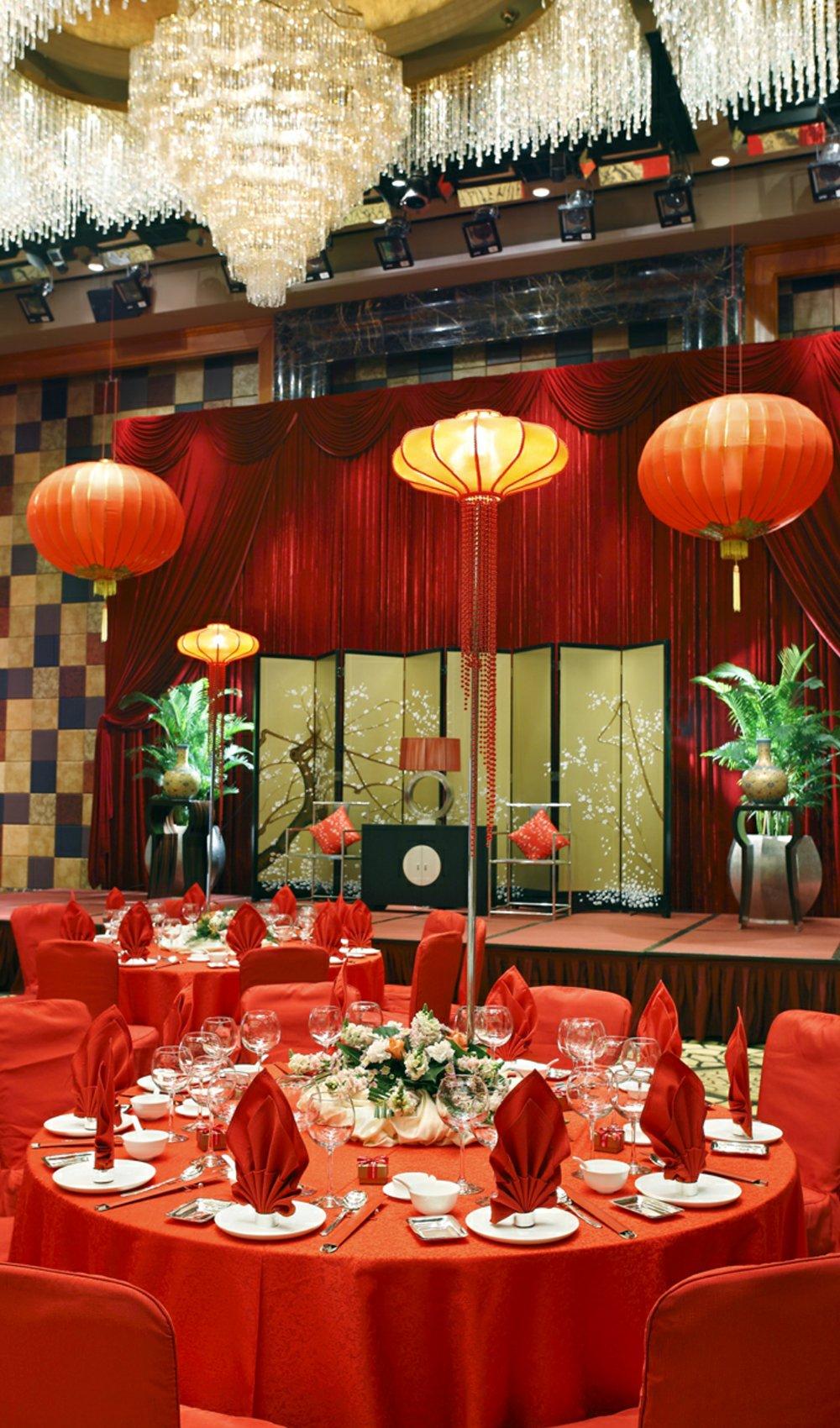
‘Many of the dishes and food served are both symbolic and auspicious, such as the fish course which symbolises abundance and a sweet lotus seed pudding which represents fertility. A roast suckling pig, to signify the bride’s purity, is always served at the wedding banquet.’
‘Shark fin soup now regularly replaces the seafood soup and there is also always a poultry dish (such as chicken or duck) to represent peace and unity.’
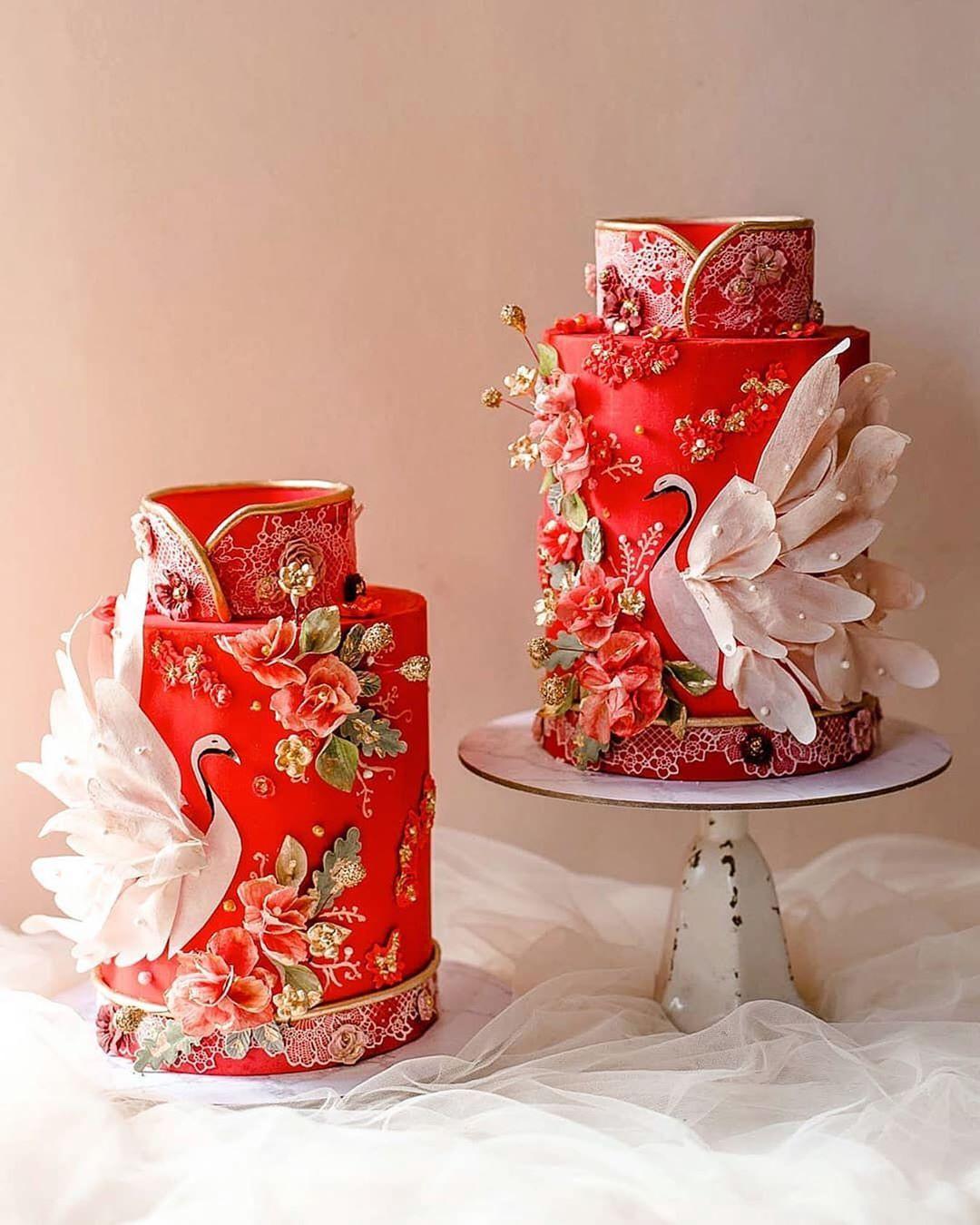
During the wedding banquet both families will also visit each table to receive blessings from all the guests.
READ MORE: Unusual Wedding Food Ideas Your Guests Will Love
What Gift Should I Give at a Chinese Wedding?
‘At Chinese weddings, gifts of red envelopes filled with money are given to the couple,’ says Vaishali. ‘Red symbolises luck, loyalty, honour and good fortune in the Chinese culture and the colour plays an important role at Chinese weddings. It is worth being aware that only new, crisp, unfolded notes should be given – so no wrinkled notes or coins.’
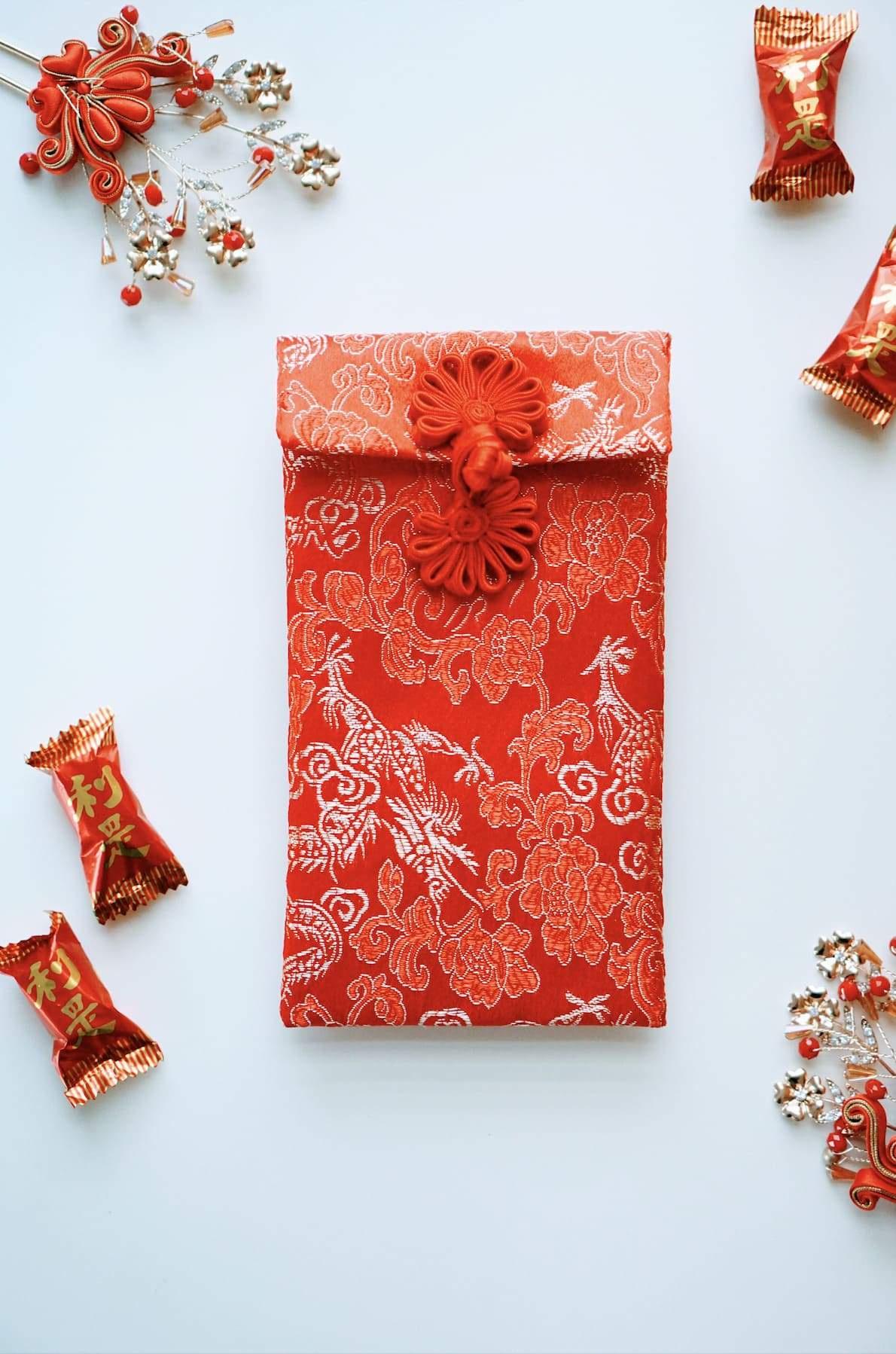
‘If the cash amount given begins with the number 4, it will immediately be considered unlucky, and so should be avoided. Similarly, do not gift anything in sets of four.’ At the other end of the spectrum, the number 8 is considered particularly auspicious, so anything with an 8 will always be considered extra lucky.
‘Gold, which represents wealth and fortune, and red, symbolising happiness and prosperity, are auspicious colours at a Chinese wedding,’ Vaishali continues. ‘The “double happiness” motif, portraying joy and unity, is very popular at weddings, and used in gifting, as well as wedding stationery and decorations.’
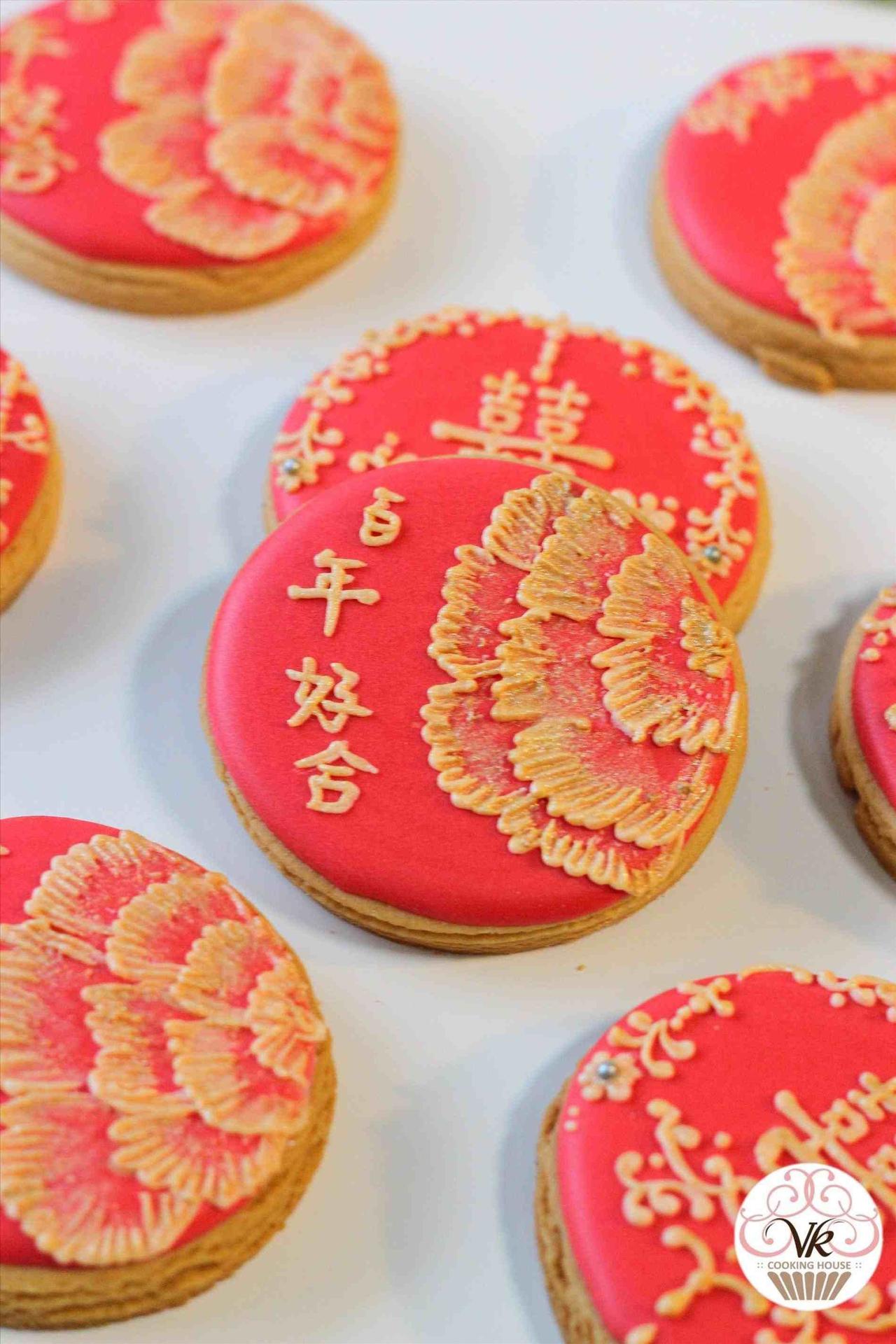
‘As black and white are often used in funerals, steer clear of giving any gifts that are predominantly black or white, or wrapping paper or envelopes in these colours. Red is a much better option for gifts and envelopes. Also avoid giving cut flowers as these are usually presents for funerals and therefore seen as a symbol of death, so are not suitable for a wedding.’
Emma adds that close relatives sometimes give pure gold gifts or jewellery should they prefer. Physical gifts or weddings lists are traditionally not part of Chinese wedding culture, but this can vary depending on the bride and groom’s preferences.
READ MORE: The 30 Best Wedding Gifts for 2020
Chinese Wedding Don'ts
You already know about not wearing red or dark colours, and avoiding bouquets of cut flowers – and according to Emma, other than that, there’s no need to worry. ‘There are no particular no-nos at a Chinese wedding, but do not speak about death or anything negative,’ she suggests. ‘Keep conversation on happy topics, so bring luck and joy to the happy couple.’
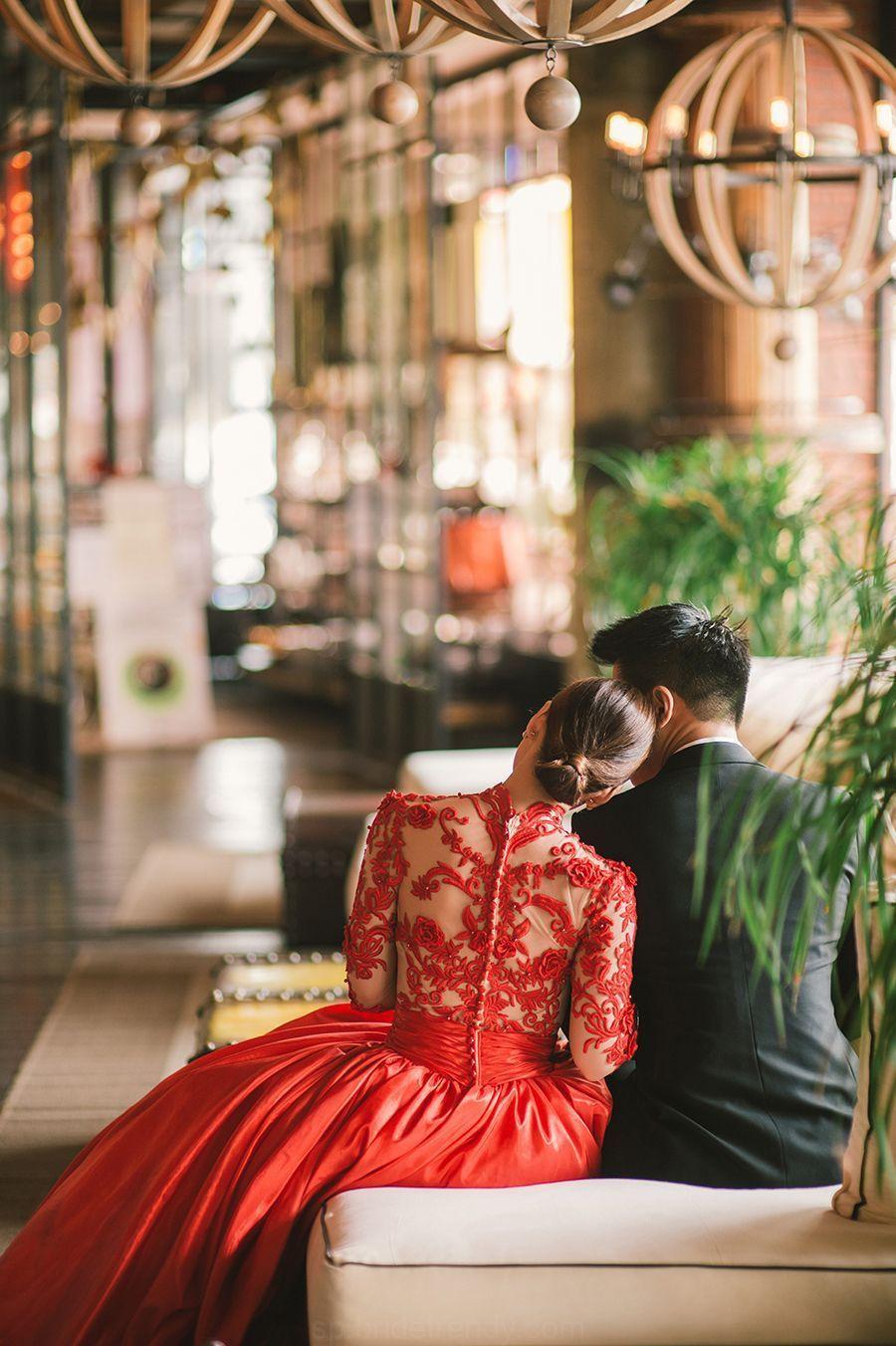
‘My main advice to anyone attending a Chinese wedding, is to be prepared for a big and colourful celebration. And have a light lunch only, so you can enjoy the banquet!’
You've got the invite, and now it's time to sort your outfit! Don't miss our pick of the best wedding guest dresses to buy now.

